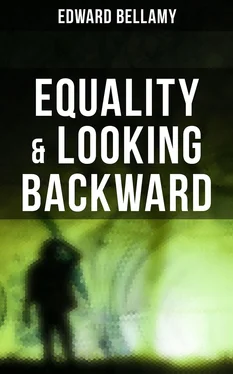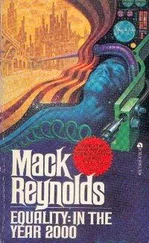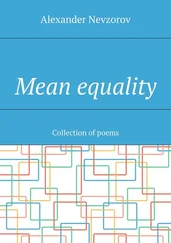“You are glad I brought you here,” exclaimed Edith, radiant, as she read in my face the success of her experiment. “It was a good idea, was it not, Mr. West? How stupid in me not to think of it before! I will leave you now with your old friends, for I know there will be no company for you like them just now; but remember you must not let old friends make you quite forget new ones!” and with that smiling caution she left me.
Attracted by the most familiar of the names before me, I laid my hand on a volume of Dickens, and sat down to read. He had been my prime favorite among the bookwriters of the century — I mean the nineteenth century — and a week had rarely passed in my old life during which I had not taken up some volume of his works to while away an idle hour. Any volume with which I had been familiar would have produced an extraordinary impression, read under my present circumstances, but my exceptional familiarity with Dickens, and his consequent power to call up the associations of my former life, gave to his writings an effect no others could have had, to intensify, by force of contrast, my appreciation of the strangeness of my present environment. However new and astonishing one’s surroundings, the tendency is to become a part of them so soon that almost from the first the power to see them objectively and fully measure their strangeness, is lost. That power, already dulled in my case, the pages of Dickens restored by carrying me back through their associations to the standpoint of my former life.
With a clearness which I had not been able before to attain, I saw now the past and present, like contrasting pictures, side by side.
The genius of the great novelist of the nineteenth century, like that of Homer, might indeed defy time; but the setting of his pathetic tales, the misery of the poor, the wrongs of power, the pitiless cruelty of the system of society, had passed away as utterly as Circe and the sirens, Charybdis and Cyclops.
During the hour or two that I sat there with Dickens open before me, I did not actually read more than a couple of pages. Every paragraph, every phrase, brought up some new aspect of the world-transformation which had taken place, and led my thoughts on long and widely ramifying excursions. As meditating thus in Dr. Leete’s library I gradually attained a more clear and coherent idea of the prodigious spectacle which I had been so strangely enabled to view, I was filled with a deepening wonder at the seeming capriciousness of the fate that had given to one who so little deserved it, or seemed in any way set apart for it, the power alone among his contemporaries to stand upon the earth in this latter day. I had neither foreseen the new world nor toiled for it, as many about me had done regardless of the scorn of fools or the misconstruction of the good. Surely it would have been more in accordance with the fitness of things had one of those prophetic and strenuous souls been enabled to see the travail of his soul and be satisfied; he, for example, a thousand times rather than I, who, having beheld in a vision the world I looked on, sang of it in words that again and again, during these last wondrous days, had rung in my mind:
For I dipt into the future, far as human eye could see, Saw the vision of the world, and all the wonder that would be Till the war-drum throbbed no longer, and the battle-flags were furled. In the Parliament of man, the federation of the world.
Then the common sense of most shall hold a fretful realm in awe, And the kindly earth shall slumber, lapt in universal law. For I doubt not through the ages one increasing purpose runs, And the thoughts of men are widened with the process of the suns.
What though, in his old age, he momentarily lost faith in his own prediction, as prophets in their hours of depression and doubt generally do; the words had remained eternal testimony to the seership of a poet’s heart, the insight that is given to faith.
I was still in the library when some hours later Dr. Leete sought me there. “Edith told me of her idea,” he said, “and I thought it an excellent one. I had a little curiosity what writer you would first turn to. Ah, Dickens! You admired him, then! That is where we moderns agree with you. Judged by our standards, he overtops all the writers of his age, not because his literary genius was highest, but because his great heart beat for the poor, because he made the cause of the victims of society his own, and devoted his pen to exposing its cruelties and shams. No man of his time did so much as he to turn men’s minds to the wrong and wretchedness of the old order of things, and open their eyes to the necessity of the great change that was coming, although he himself did not clearly foresee it.”
Table of Contents
A heavy rainstorm came up during the day, and I had concluded that the condition of the streets would be such that my hosts would have to give up the idea of going out to dinner, although the dining-hall I had understood to be quite near. I was much surprised when at the dinner hour the ladies appeared prepared to go out, but without either rubbers or umbrellas.
The mystery was explained when we found ourselves on the street, for a continuous waterproof covering had been let down so as to inclose the sidewalk and turn it into a well lighted and perfectly dry corridor, which was filled with a stream of ladies and gentlemen dressed for dinner. At the comers the entire open space was similarly roofed in. Edith Leete, with whom I walked, seemed much interested in learning what appeared to be entirely new to her, that in the stormy weather the streets of the Boston of my day had been impassable, except to persons protected by umbrellas, boots, and heavy clothing. “Were sidewalk coverings not used at all?” she asked. They were used, I explained, but in a scattered and utterly unsystematic way, being private enterprises. She said to me that at the present time all the streets were provided against inclement weather in the manner I saw, the apparatus being rolled out of the way when it was unnecessary. She intimated that it would be considered an extraordinary imbecility to permit the weather to have any effect on the social movements of the people.
Dr. Leete, who was walking ahead, overhearing something of our talk, turned to say that the difference between the age of individualism and that of concert was well characterized by the fact that, in the nineteenth century, when it rained, the people of Boston put up three hundred thousand umbrellas over as many heads, and in the twentieth century they put up one umbrella over all the heads.
As we walked on, Edith said, “The private umbrella is father’s favorite figure to illustrate the old way when everybody lived for himself and his family. There is a nineteenth century painting at the Art Gallery representing a crowd of people in the rain, each one holding his umbrella over himself and his wife, and giving his neighbors the drippings, which he claims must have been meant by the artist as a satire on his times.”
We now entered a large building into which a stream of people was pouring. I could not see the front, owing to the awning, but, if in correspondence with the interior, which was even finer than the store I visited the day before, it would have been magnificent. My companion said that the sculptured group over the entrance was especially admired. Going up a grand staircase we walked some distance along a broad corridor with many doors opening upon it. At one of these, which bore my host’s name, we turned in, and I found myself in an elegant dining-room containing a table for four. Windows opened on a courtyard where a fountain played to a great height and music made the air electric.
“You seem at home here,” I said, as we seated ourselves at table, and Dr. Leete touched an annunciator.
Читать дальше










